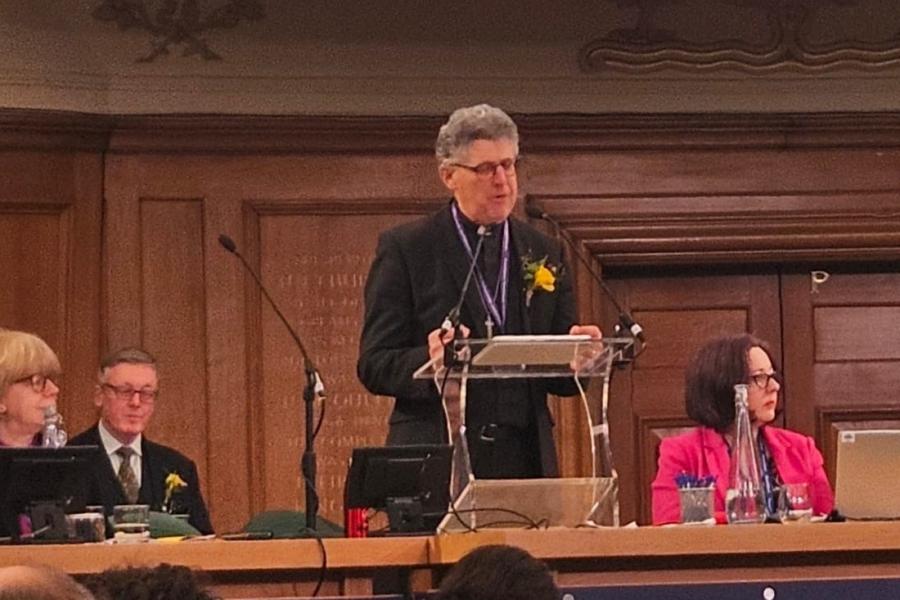Executive Summary:
In 2018 the Diocese[1]made a deficit of over 1 million for the first time. This arises because we spent more on parishministry, support for ministry and mission and our administration than wereceived as income.
Here I will explain:
- That our incomeas parishes and as a diocese has been flat whilst our costs rise, and that thisis projected to continue. Were in thistogether.
- That although wehave reserves, a large proportion of them legally cannot be spent.
- What were doingto tackle the issue.
- Three ways thatparishes can help.
Whats behind this?
The simple answer is that we struggle to beat inflation, as parishes and as a diocese.

Charting theincome of parishes and the diocese shows markedly similar patterns - overthe past ten years the unrestricted income of parishes (left chart) and thediocese (right chart) has been broadly flat (the blue line); whilst inflationhas meant that the real value of this has decreased (the dotted red line).It is certainly not the case that diocesanincome has been increasing while parishes struggle we are all in thistogether.
Why?
There are some clear,yet profound, challenges that are behind this:
- At parish level,statistics show that on average were losing around 2% of our givers each year,yet those who remain are increasing their giving by around 2%, thus causingincome to be flat.
- With regard to parish share, parishes were ableto increase their contribution last year by 1.1%, which represents a clearcommitment from many parishes; yet because this is lower than the amount requested, the percentagecontributed dropped and the level of our deficit increased.
But havent we got loads of money in reserves?
Yes.. and no!!
Parishes have over 24million in reserves, although a proportion of this is restricted. Its unevenlydistributed some parishes have considerable reserves, others have very few.
The Diocese does have42 million of Endowments but this money cannot legally be spent. All wecan do is receive an income from this. Last year we received a contribution of 900,000 towards clergy stipendswhich meant that we were able to ask for less in Parish Share. Our accounts also show 18.8 million ofhousing assets the vast majority of which is the provision of homes for ourclergy. Our unrestricted reserves, themoney we can spend, dropped by 1.2 million to 4.8 million last year. Itsrunning out.
How are we tackling this?
We will need to reduce our spending, and seek to increase our income. TheBishops Council has tasked two groups to develop proposals to make significantreductions in spending, (one with regard to central costs at the diocesanoffice, the other with regard to ministry costs in the wider diocese) whilstensuring that as far as possible we are able to maintain our focus on mission.
Were also proposing to Synod that we establish a group to review theShare System. This will not solve all ofour issues, but it is clear that the system needs some degree of change.
How can we help as a parish?
What is clear is thatthis is an issue that is facing us as parishes and as the diocese. Were facingdeclining numbers and a corresponding decline in finance. Here are three thingsthat we can do:
- Ensure that weare focused on mission and bringing new people into Church. This is notprimarily to attract more givers, but first and foremost so they can come toknow the love of God.
- Encouragegenerosity. In particular, consider joiningthe Parish Giving Scheme.
- Be as generousas you can with your Parish Share contribution. Some parishes have seen areduction in the amount of Share asked this year, whilst other parishes haveseen a very high increase. If some of those who have seen a reduction are ableto contribute for a year or two at the previously requested level this wouldease the pain for those seeing very large increases.
Just as you will beexpressing your gratitude to those who give to support the work of your parish,so the wider diocese is grateful for all that is contributed in parish share,as well as to all those who minister faithfully in whatever capacity, lay orordained. These are challenging times,and the challenges are set to continue, but by working together, supporting andchallenging each other to new ways of working, we can overcome the significantchallenges that lie ahead.
John Preston, Diocesan Secretary
[1]Legally, the Diocesan Board of Finance.

